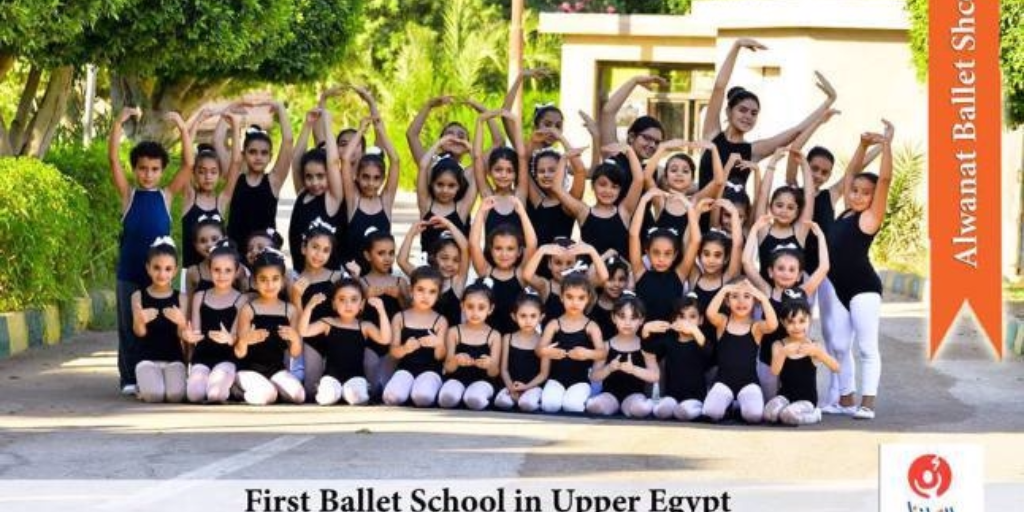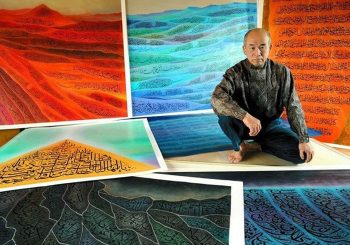By Rana Khaled
In a close-minded society where dancing is not a preferred art form, a group of young people decided to challenge customs and traditions and launch the first ballet school in Upper Egypt.
The Alwanat initiative was established in Minya to promote the belief that every person has the right to taste different types of art and engage in various cultural initiatives to build a more open and intellectual personality.
“Alwanat is a non-governmental self-funded organization that is interested in leading artistic and cultural initiatives in Upper Egypt,” said Marco Adel, the main founder of the initiative.
“It was founded by a group of young people with the aim of spreading different kinds of arts and raising awareness about the role of the arts in changing society. We wanted to overcome the centralization of all the artistic schools in Cairo and Alexandria and provide the residents of Minya and other governorates in Upper Egypt area with a chance to taste the arts and engage in cultural events,” he added.
Supporting filmmakers in Upper Egypt and providing them with an opportunity to present their work to a large audience is another main goal of the organization.
“With the help of Mohammed El Adl, the leading producer, and Mai Nour El Sherif, the actress, and many others, we managed to hold our first cinema festival which received the attention of the audience and media. We also cooperated with Youssef Shahine’s company for producing and screening a number of independent movies,” he noted.
Although the organization provides training sessions for different kinds of art such as painting, music, acting, singing, handicrafts, photography, and others, the ballet school is one of its biggest achievements until now. A lot of residents in Upper Egypt have been deprived of pursuing their dreams of joining a ballet school because they could not find appropriate facilities and instruction.
“We wanted to provide people in Upper Egypt governorates with a way of learning arts that were not available before. We wanted to make their dream come true and provide new generations with a chance to taste this kind of art instead of watching it on television screens,” he added.
In the past, students had to move to Cairo or Alexandria to join the Higher Institute of Ballet, the Cairo Opera House, or the number of private schools in order to be in a respectable ballet school. This presented a large barrier to entering the art.
“Before launching the ballet school, we wanted to explore people’s opinions about the idea. We distributed questionnaires to parents and children to know whether they would support the idea or not. A large segment of our audience was interested in the idea so we didn’t have to exert any effort to convince them of it,” Adel explained.
However, the founders of the initiative were attacked by a large number of extremists who started threatening them on their official Facebook page, accusing them of destroying ethics and morals of the conservative society and spreading values that are strange to Upper Egypt.
“Some people advised us to start building hospitals or schools for teaching Quran and religious lessons instead of introducing ballet dancing. However, we didn’t let such attitudes prevent us from achieving the dream of dozens of children in Minya and other surrounding governorates. We currently have about 150 students and most of them are girls who range from 4 to 20 years old,” he added.
At the beginning, the school attracted certain social classes who were more open-minded and had the capability to pay for the sessions. However, after posting photos and videos about the school on our social media, the school began to attract more people from other social classes.
After finishing the initial training period, the school intends to participate in a number of local and international competitions. “The first stage will include some shows in Minya, then other governorates in Upper Egypt, moving to Cairo and Alexandria after that. We have a dream of performing in big theatres around the globe,” Adel noted.
On the other side, Ahmed Yehia, one of the leading ballet dancers in Egypt believes that such a step will help promote this kind of art in Egypt on a wider scale. “Egypt is a huge country with a large number of residents. If we only have three ballet schools in each governorate, this would make us come on the top of the countries that support such art,” he said.
“Ballet dancing only needs some psychical and mental capabilities that are available in every place in Egypt. We just need to start, and I believe that Upper Egypt is a very good place to start spreading this art,” Yehia added.
Although this school is considered an independent initiative, further cooperation with the Higher Institute of Ballet and the Cairo Opera House is still needed. “Such cooperation will improve the quality of the service we provide and will encourage our students to compete on a wider level. We still need more equipment, clothing, and trainers,” Adel concluded.







Comments (0)